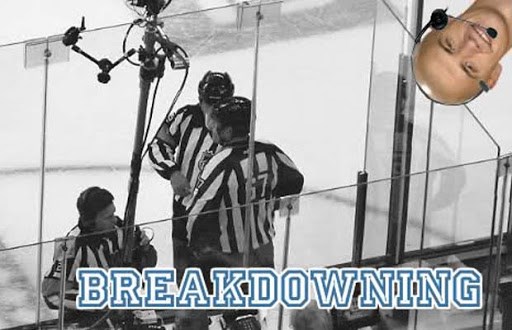The last time the Canucks won a playoff series, Troy Stecher was 17 years old and playing for the Penticton Vees in the BCHL. A native of Richmond, BC, Stecher grew up a Canucks fan and the 2011 playoff run looms large in his memory.
Could he have imagined at the time that the next time the Canucks won a playoff series, he would score the game-winning goal?
Stecher downplayed the importance of the series win after the game — “We’re not content, we’ve still got a lot of work to do” — but deep inside, he must be buzzing. It’s literally the type of moment every young Canucks fan dreams of, stepping up in a big playoff game for your hometown team and scoring the gamewinner.
To top it off, it was one of the prettiest goals of the playoffs, a stunning tic-tac-toe passing play that had the St. Louis Blues, one of the best defensive teams in the NHL all season, completely lost in their defensive coverage.
To get a better sense of just how good that goal truly was and how completely the Canucks bamboozled the Blues, we need to break it down in a feature we at Pass it to Bulis like to call Breakdowning.
First, the goal:
Dang, that was nice. Now, let’s break it on down.
Let’s start with a roll call. We’re going to take it back to 14 seconds before the goal, when the Blues’ Justin Faulk gained the zone on the right side. Unbeknownst to the Blues, this is about when things started to go wrong for them.
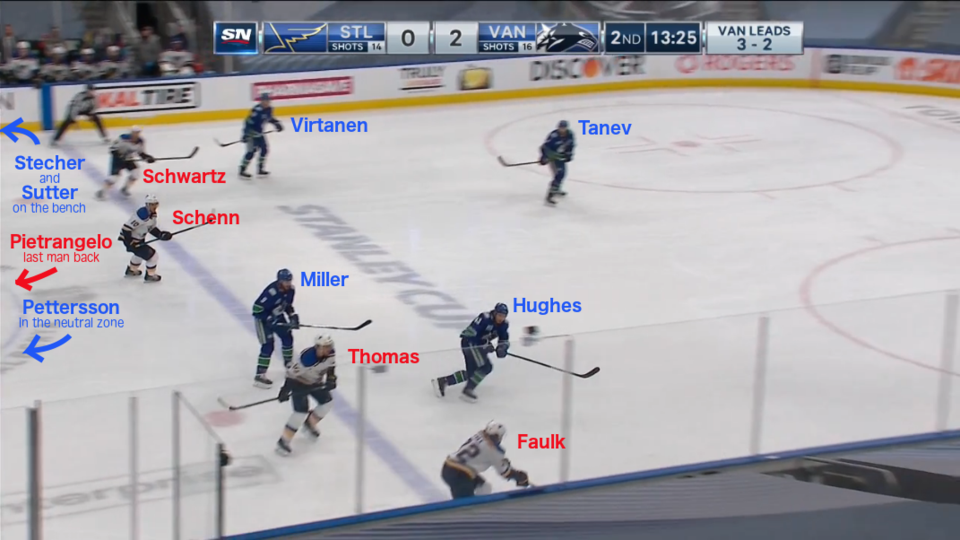 Roll call!
Roll call!
The Canucks have a variation of their top line on the ice: Elias Pettersson, J.T. Miller, and Jake Virtanen, along with the defence pairing of Quinn Hughes and Chris Tanev. They’ve been on the ice for about 34 seconds now, getting close to the average shift length that head coach Travis Green has in mind for his forwards, so they should be looking to make a change. That’s going to work to their advantage.
They’re up against the first line of the Blues — Brayden Schenn, Jaden Schwartz, and Rob Thomas — with Alex Pietrangelo coming onto the ice for Marco Scandella as the play develops in the 麻豆传媒映画end. He’ll be the last man back as Faulk jumps up the ice, trying to spark a comeback from a 2-0 deficit.
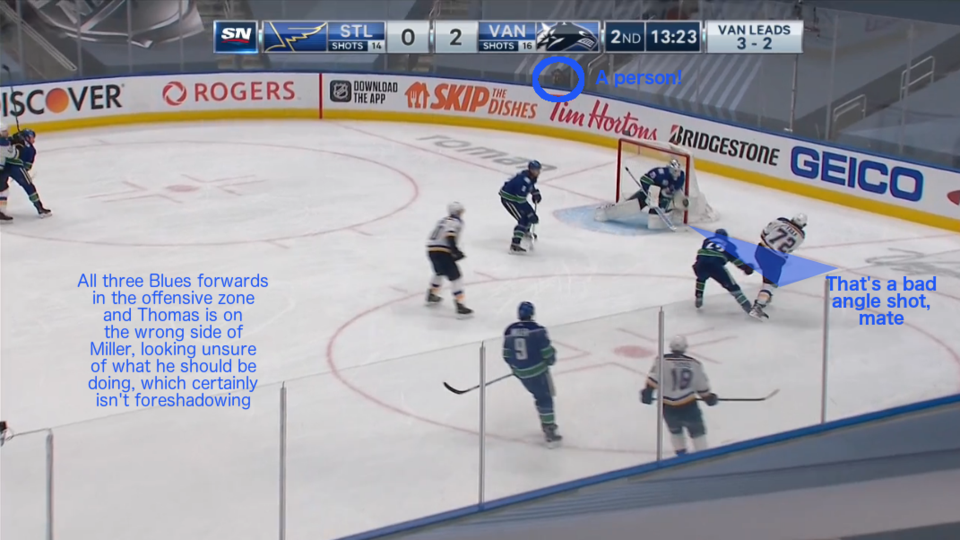 Faulk is not a better skater than Hughes.
Faulk is not a better skater than Hughes.
Hughes keeps a great gap on Faulk, effortlessly matching his skating stride to keep Faulk to the outside. Instead of turning back to maintain possession, Faulk opts for a bad angle shot, perhaps desperate at this point to make something happen for the Blues in this game.
It’s a bad idea. Hughes has his stick in Faulk’s shooting lane, so any attempt that would hit the net is going to get deflected away. But Faulk’s shot was never going to hit the net. He misses completely.
And look at that! The stands may be empty, but there’s someone behind the glass! It’s a photographer! Neat!
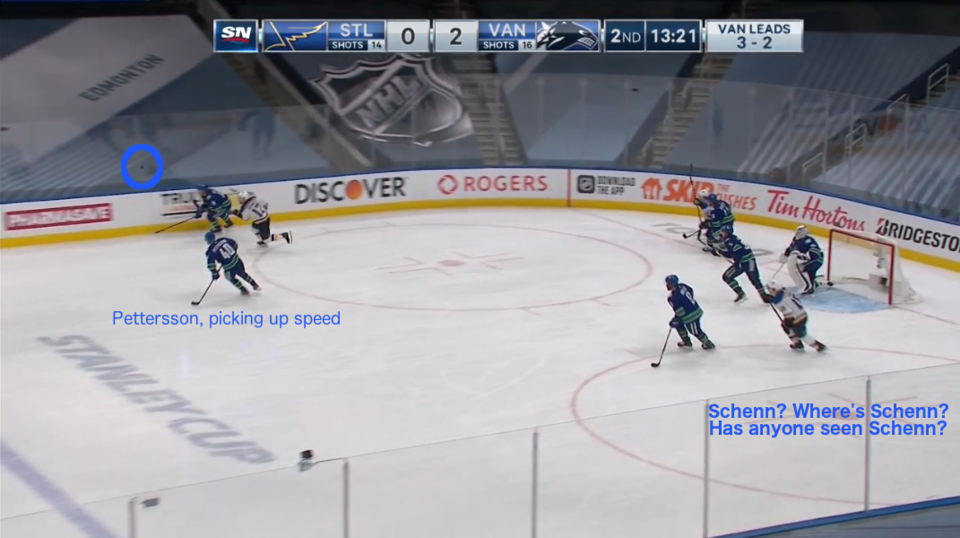 And here. we. go.
And here. we. go.
Faulk’s shot rings around the glass, hits the dasher, and keeps going, all the way out to the neutral zone. Pettersson, late coming back to the defensive zone as he was furthest up the ice for the Canucks a moment earlier, is in the perfect spot to pick up speed en route to the puck.
Miller, recognizing the potential for an odd-man rush, starts to churn the ice, while Rob Thomas is a couple steps behind him and just starting to realize the danger.
Meanwhile, Schenn takes a wide turn to the right, ending up all the way in the corner of the Canucks’ end of the ice. He’s completely out of view in the above shot, which is going to leave him well behind the play as it moves up ice.
 Pay no attention to the men behind the curtain, coming off the bench.
Pay no attention to the men behind the curtain, coming off the bench.
Let’s take the reverse angle for a moment as Pettersson carries the puck into the Blues’ zone and changes his pace, slowing down to create a wider gap between himself and Pietrangelo.
I want to take this view, because it shows Virtanen and Tanev’s biggest contribution: getting off the ice. That’s no slight to either of them; it was the right move. Virtanen could have tried to jump up with Pettersson and Miller to create a 3-on-2, but the Blues were backchecking hard — too hard as we’ll see in a moment — and it was a better option for him to keep his shift short.
Meanwhile, with Hughes jumping up to join the rush, Tanev makes the sensible decision to get a fresh defenceman on the ice.
Brandon Sutter steps on for Virtanen; Stecher steps on for Tanev. Notably, not a single Blues player is paying attention to who’s coming off the bench: they’re single-mindedly focused on the backcheck, allowing Sutter and Stecher to sneak into the zone undetected.
“Keep your distance, Stecher,” , “but don’t look like you’re trying to keep your distance.”
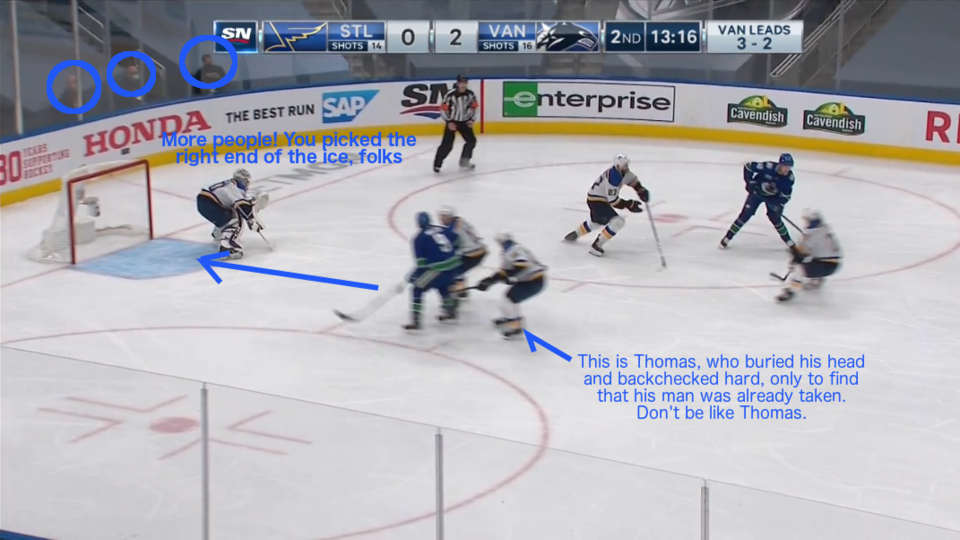 Not so Smooth from Rob Thomas
Not so Smooth from Rob Thomas
It’s amazing how poorly this goes for the Blues, because it really shouldn’t. At this moment, it’s a 2-on-4. Even with Hughes following up the rush as the trailer, it’s still a 3-on-4, and Hughes is being pursued by Schenn as well, ultimately to the Blues’ detriment.
The Blues have plenty of players back to defend, they just all get fixated on a few players and the puck. They backcheck hard, but they don’t backcheck well. There’s a difference.
Unlike Faulk, who charged to the net heedless of anything else and settled for a bad angle shot, Pettersson keeps his head on a swivel and stops up, creating all sorts of room. Meanwhile, Miller charges hard to the net, picked up by Schwartz.
The biggest problem for the Blues: Thomas. Remember how he was a step behind Miller? Recognizing that he had lost his man, Thomas buried his head and churned ice on the backcheck, an admirable effort. But effort towards the wrong goal is wasted effort.
With Schwartz picking up Miller, Thomas needed to read the situation and realize that he needed to pick up a different man. Instead, he ends up double-teaming Miller, who never even touches the puck on this play, and Thomas ends up completely lost for the remaining five seconds before the goal.
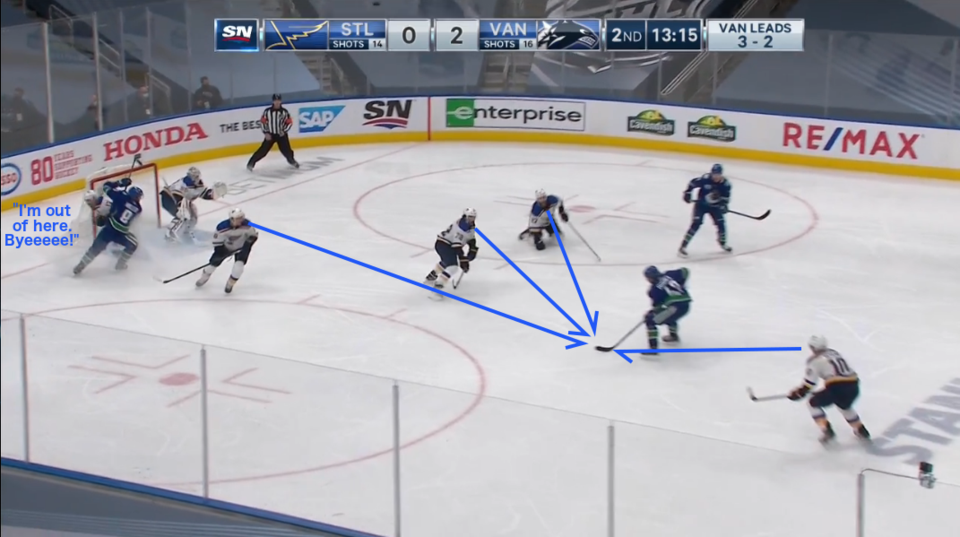 Stay on target. Stay on target. Stay on target.
Stay on target. Stay on target. Stay on target.
Even now, as Pettersson finds the trailing Hughes, all is not lost for the Blues. It’s a 3-on-4 with Schenn backchecking as well. All five Blues skaters are back in the defensive zone: all they have to do is get organized, make good reads, and pick up their checks.
Unfortunately for the Blues, like the Library of Alexandria in 47 BC, there were no good reads to be found.
Instead, the Blues get caught puck-watching, with everyone’s eyes locked on to the puck on the stick of Hughes. To an extent, it’s understandable: Hughes is incredibly dangerous with the puck thanks to his soft hands and magic skates. The thing is, that makes it all the more important that you cover everyone else on the ice effectively and take away passing lanes, or Hughes will pick you apart.
Well, there is one player that isn’t watching the puck. Schwartz, who backchecked so effectively on Miller, makes a crucial mistake: he keeps skating. When Miller stops up in front of Jordan Binnington, Schwartz keeps going. If he stops and battles Miller in front of the net, that changes everything.
He doesn’t.
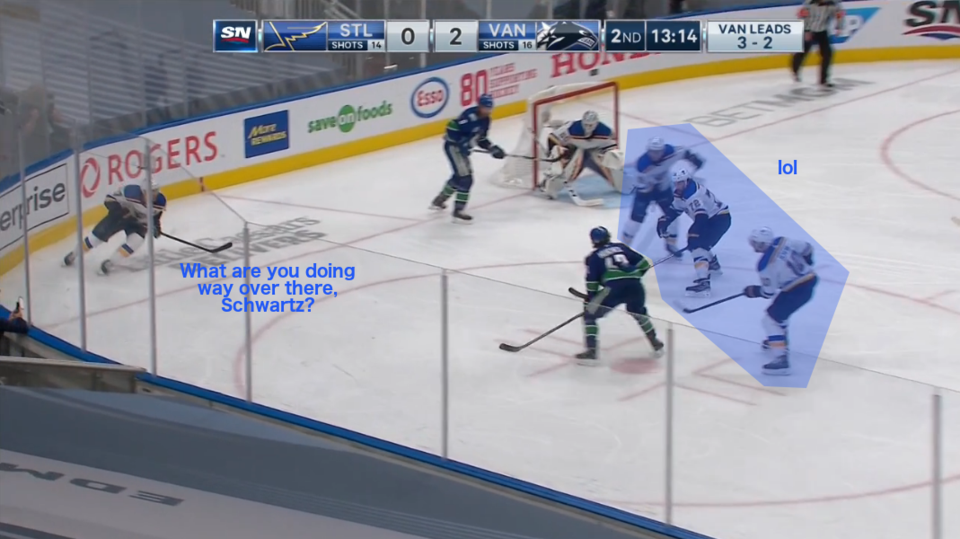 lol
lol
Let me know if you can spot the problem for the Blues, here. You probably don’t even need my expertly-drawn illustrations pointing out what’s gone wrong.
Schwartz is off in the corner, looping around to rejoin the play. Thomas, Faulk, and Schenn are all locked in on Hughes. That’s four players for the Blues all around one player for the Canucks. In case you flunked math, that means it’s a 4-on-1 for the Canucks everywhere else on the ice.
Of all the Blues, Faulk is the one that seems to be doing the right thing. He backchecked hard, but didn’t lose sight of Hughes, the trailer, who was his responsibility. As Pettersson passed the puck, Faulk peeled off Pettersson and tried to close the gap on Hughes, and he’s doing a decent job. His stick is angling Hughes to the outside, preventing a good quality shot.
It’s the other three that are a disasterpiece of defending.
Schwartz, as said previously, should have stayed on Miller in front of the net, and is instead off in the middle of nowhere. Thomas, who blindly backchecked Miller when he was already covered, is now in no man’s land, covering nobody. Schenn is fixated on Hughes, when he should pass off that responsibility and maybe do a shoulder check to see if there are any other Canucks skaters on the ice, because usually there are at least five.
Of course, if Schenn hadn’t taken such a wide loop in the Canucks’ zone earlier in this sequence, he wouldn’t be chasing the play right now. And if Thomas had stayed above Miller, he wouldn’t have chased and ended up in no man’s land. And if Faulk hadn’t missed the net on a bad angle shot, none of this would’ve happened. It’s a domino effect.
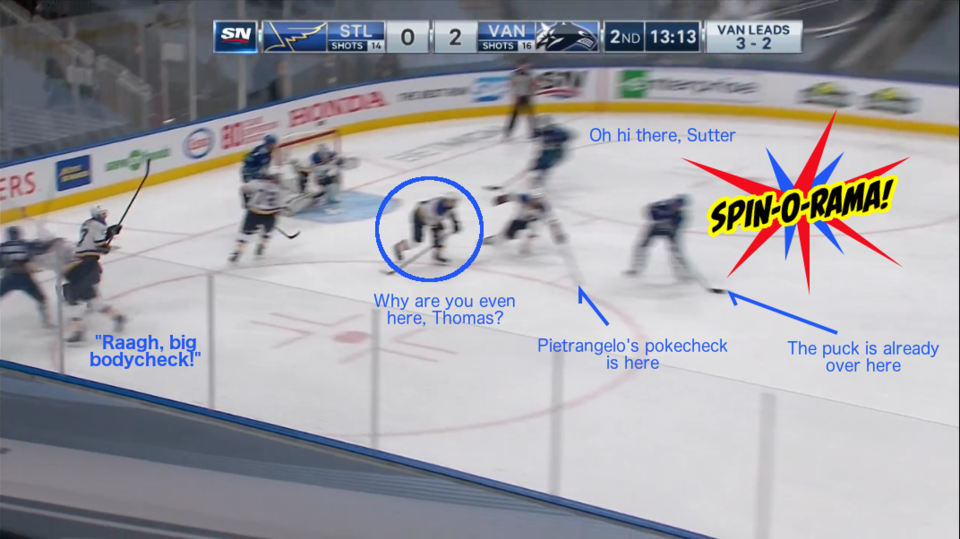 We now present this goal in spin-o-rama vision!
We now present this goal in spin-o-rama vision!
Everything is blurry at this point because it all happens so fast, but it’s set up by everything that preceded it.
Schenn uselessly finishes his check on Hughes, as if to show that he didn’t completely screw up and was doing the right thing all along. He wasn’t.
Schwartz runs into Schenn, taking him even more completely out of the play.
Thomas is completely lost in the woods. If he had looked around instead of locking his eyes on the puck, he might have seen Sutter skating to the backdoor and done something useful. Instead, he just stands in the middle of the ice and watches the Canucks pass the puck around him.
Pietrangelo tries to get his stick on the pass to Pettersson, but he’s not even close. To make matters worse for Pietrangelo, Pettersson makes a slick spin-o-rama move to get the puck over to Sutter, and all of Pietrangelo’s momentum is now heading in the opposite direction of the puck.
The only one who does something useful here iis once again Faulk, who identifies that Miller is alone in front and moves to check him, lifting his stick to prevent a backdoor feed from Sutter for a tap-in goal.
But seriously, that spin pass from Pettersson is something else.
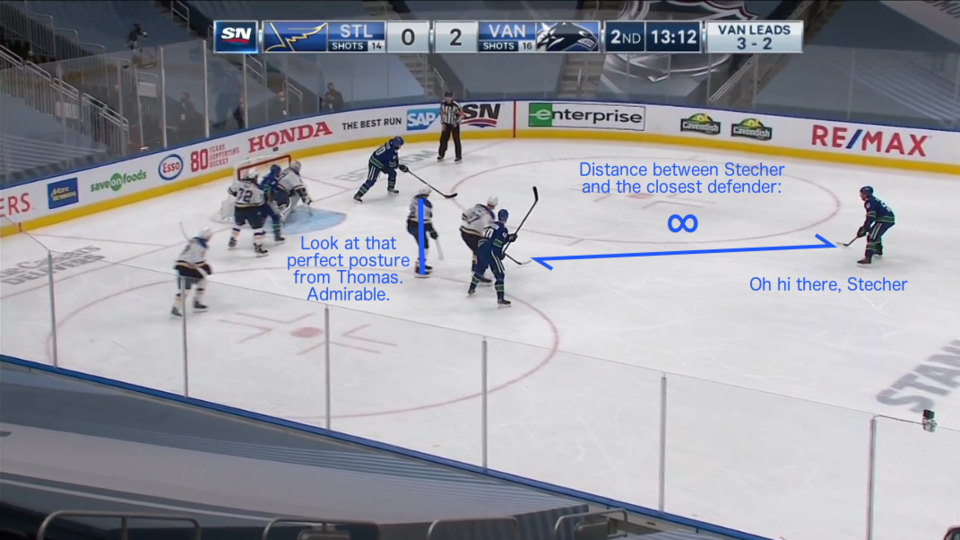 Proper posture is essential to your long-term health.
Proper posture is essential to your long-term health.
I know it seems like I’m picking on Thomas, but this might be the most damning shot of the entire breakdown. The puck has gone to a wide open Sutter at the side of the net. Stecher is even more wide open at the top of the faceoff circle. Thomas is checking no one. The Blues are down 2-0 already and can’t afford another goal against. This is a desperate situation.
Thomas is just standing there, ramrod straight, just watching the puck.
He’s blown this sequence about as badly as he possibly could and it hasn’t even clicked in his head that he might want to try to do something about it.
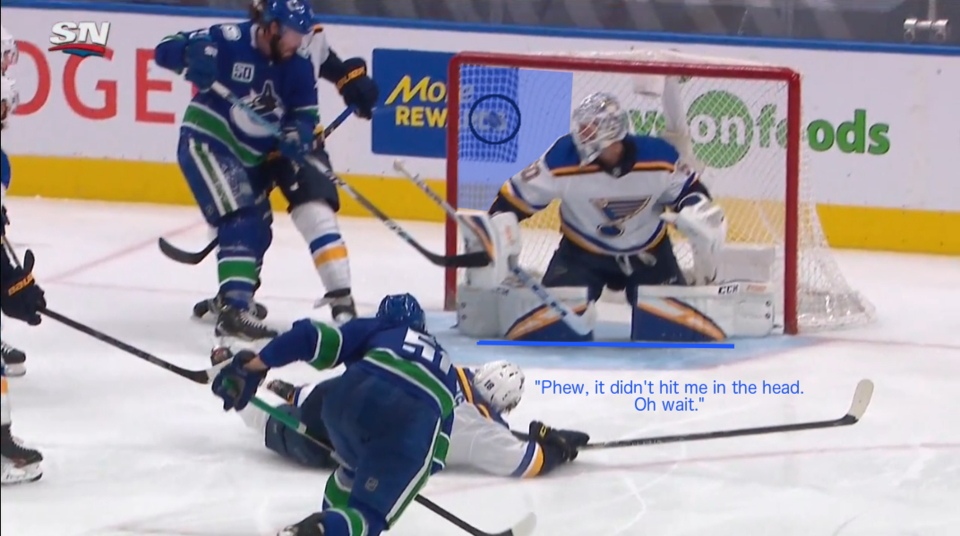 Nice try, Thomas.
Nice try, Thomas.
Let’s switch to one last angle for the goal itself. Stecher steps into Sutter’s pass and buries it off the post and in, but let’s take note of just how much space there is for Stecher to shoot on the blocker side.
The reason there’s so much space is Binnington was caught on his post to prevent Sutter from trying to jam the puck in at the side of the net. When Sutter passes, instead of making a hard push to the top of the crease to cut off the angle, Binnington simply stands up.
I put a line across the top of Binnington’s butterfly to emphasize just how deep in his crease he is for Stecherr’s shot. To have any chance of making the save, he needed to be right at the top, but he instead lands a couple feet short. That leaves all sorts of space for Stecher to pick his spot.
Even if Binnington does push out hard to the top of the crease, Stecher might still score, as it was a fantastic shot, but Binnington doesn’t even give himself a chance.
Meanwhile, there’s poor Rob Thomas, finally realizing that he needed to do something. That something was to dive head first across Stecher’s shooting lane, ducking his head in desperate hope that he won’t take the puck directly off the ol’ noggin. He’s far too late, of course: by the time Thomas actually reaches the shooting lane, the puck has already hit the post.
On the plus side, Thomas ducking his head away from the shot gave him the perfect view to watch the puck go in, which is fitting given how much puck-watching he did throughout the entire sequence.
Though that’s not really a plus for Thomas. Literally, it was a minus for Thomas.
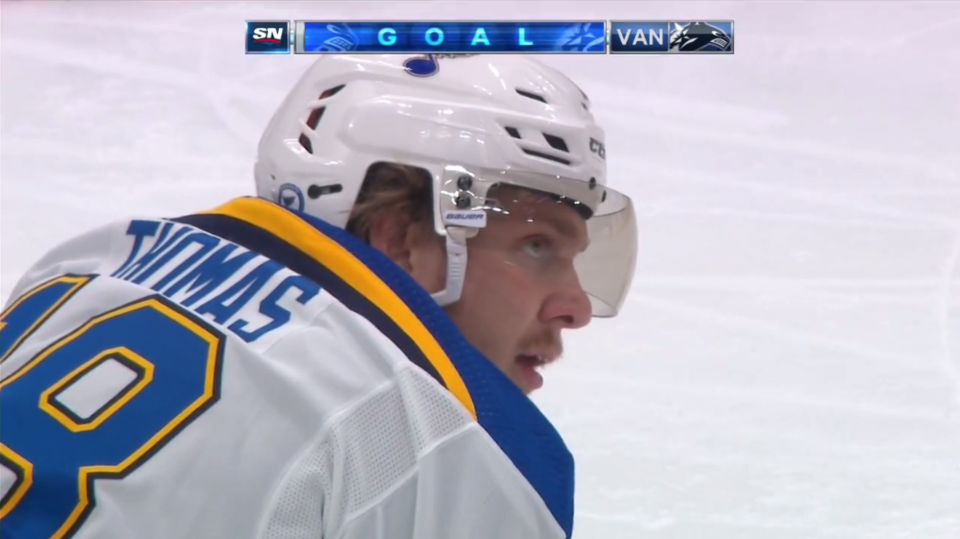 Ouch.
Ouch.
Sorry Thomas, this Breakdowning wasn’t very nice to you. Better luck next time.
